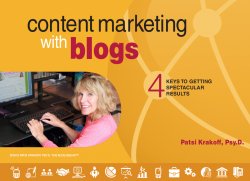If you are writing content designed to persuade and influence, you need to know what makes people tick. (photo courtesy of digitalart/FreeDigitalPhotos.net)
There are universal drives that are common in all human beings, across cultures, across the globe. When you create content that appeals to either of these four basic drives, you can’t help but engage the hearts and minds of readers on a profound level.
We can learn a lot from evolutionary studies. Our brains haven’t changed much, nor have our fundamental motivations.
I suggest a frame work for understanding basic human motivations: the Four Drive Theory, presented by Professors Paul R. Lawrence and Nitin Noria in their 2001 book Driven: How Human Nature Shapes Our Choices.
There are many theories about what motivates behaviors, but I like this Four Drive theory because it is based on studies of primitive man, primitive societies, and the evolution of brain functioning over the last 100,000 years.
It doesn’t matter if you view humans as being motivated according to Maslow’s Hierarchy of Needs, or Freud’s Pleasure/Pain framework, or any other drive theory. What matters for marketing is that you understand basic human drives, and what drives peoples’ behaviors at their most fundamental sources.
This theory doesn’t exclude other theories, but as a framework for marketing, I think it works quite well. Keeping these four things in mind, you can create more effective marketing that reaches the subconscious brains of your consumers.
These four fundamental drives motivate all human beings. Some are stronger drives than others, but we all have all four operating in the background of our lives.
Neuroscientists and anthropologists know that our brains haven’t changed much over the last 100,000 years. We are still driven by four key motivators. Everything the brain does is strongly motivated by these four drives:
- The drive to acquire objects and experiences that improve our status relative to others.
- The drive to bond with others in long-term relationships of mutually caring commitment.
- The drive to learn and make sense of the world and of ourselves.
- The drive to defend ourselves, our loved ones, our beliefs and resources from harm.

Each of these drives has been shown to exist in all human beings, in all cultures, all over the globe, throughout history for the last 100,000 years.
These common drives are what ensured our survival in dangerous primitive environments. They also ensure our survival in the modern world.
Owning an iPad, or a BMW, may not seem to be essential for your survival, nor are many of the other consumer items on the market. But acquiring goods can improve your status among your tribe, thereby ensuring your attractiveness to your mate and family. It improves your ability to bond, to learn, and to defend yourself and protect your family.
These four drives play heavily into why we buy, what we read, where we surf the Web. Everything marketers create appeals to one or several of these four drives. When you create content that appeals to our innate drive to improve our status among our tribe (or family), you tap into a powerful force.
And that’s just one drive, one opportunity to engage reader’s emotional responses. In some people, one drive will be more motivating than another.
For example, as a psychologist and journalist (some say I might be a psycho-journalist), I have a strong drive to learn.
My drive to learn is overwhelmingly strong at times, almost to the point of ignoring my need to acquire money. (I may die poor, but I’ll be extremely knowledgeable and happy to share what I’ve learned.)
My drive to bond is weak, I prefer to bond with a select few rather than with most people. I will defend myself and my husband, my kitties and my property with the ferociousness of a mother lion, often to my surprise.
How can you market to me? Tell me there are secrets to content marketing or neuromarketing (or tennis) I need to know, that will make my life easier, and save me time. Reassure me there are no risks. Let me know that you can be trusted to answer my questions with easy follow up access.
What about you? What are the best ways to market to you, considering your nature?















Recent Comments